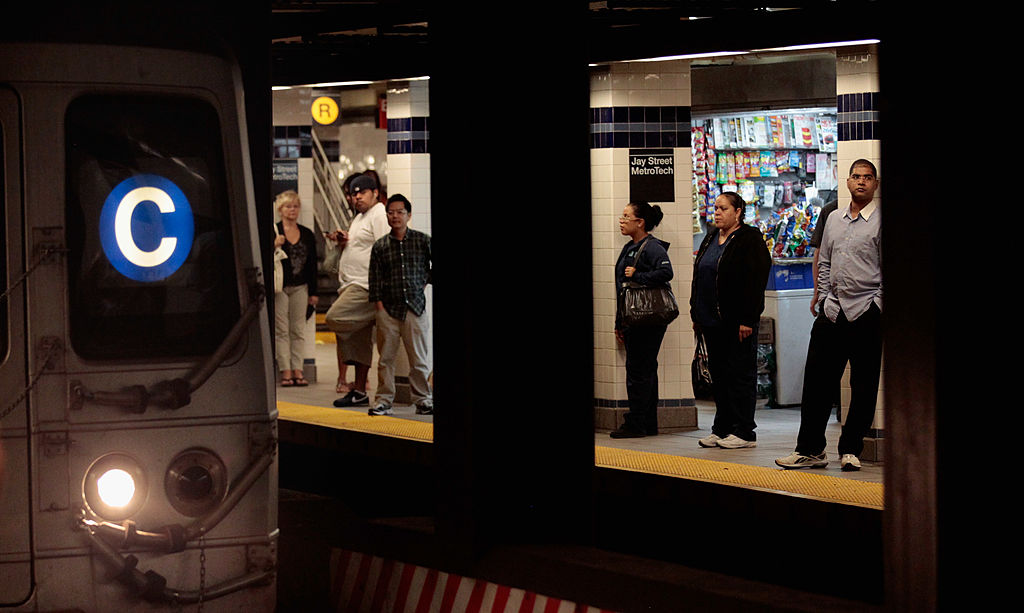How New York City's C train cars are the perfect metaphor for America's crumbling infrastructure

A free daily email with the biggest news stories of the day – and the best features from TheWeek.com
You are now subscribed
Your newsletter sign-up was successful
Fifty-three years after being introduced as the bright, shining beacon of the Big Apple's bustling future, New York City's C train cars are barely chugging along. With passengers facing ever-increasing delays and service suspensions in the city's subway system, the train cars, "the oldest in continuous daily operation in the world," now serve as a metaphor for the city's — and the country's — tangled transportation conundrum, The New York Times noted Tuesday:
As increasing delays and other problems in the city's subway system have reached a breaking point, the story of why New York, the economic capital of the world, employs subway cars long past their expiration date is illustrative of many issues plaguing the region's transit infrastructure and why fixes are hard. The tale of the Brightliners, and how difficult it has been to replace them, perfectly exemplifies the challenges, missed opportunities, and lack of resolve — both political and financial — that have caused the system to arrive at the verge of collapse. [The New York Times]
The C train cars don't just look old; they act old too. The New York Times reported that the R32 cars "break down far more often than any other train in the system, averaging just 33,527 miles between failures." The average car breaks down every 400,000 miles.
As glaring as the problems are, the city just can't seem to get things fixed. The New York Times reported that "though funding for cars to replace the R32 was set aside years ago, the delivery of the new equipment is well behind schedule, tens of millions of dollars over budget, and still more than a year from being fulfilled."
The Week
Escape your echo chamber. Get the facts behind the news, plus analysis from multiple perspectives.

Sign up for The Week's Free Newsletters
From our morning news briefing to a weekly Good News Newsletter, get the best of The Week delivered directly to your inbox.
From our morning news briefing to a weekly Good News Newsletter, get the best of The Week delivered directly to your inbox.
Once the new cars finally arrive, the old ones still won't be booted off the track. The transportation authority is planning to keep the C train cars up and running while the city tries to plug another hole in the city's transportation system: the failing portions of East River Tunnel that services the L train line, which were damaged in 2012 by Hurricane Sandy.
Read more on the city's struggles to replace the C train cars at The New York Times.
A free daily email with the biggest news stories of the day – and the best features from TheWeek.com
-
 Film reviews: ‘Send Help’ and ‘Private Life’
Film reviews: ‘Send Help’ and ‘Private Life’Feature An office doormat is stranded alone with her awful boss and a frazzled therapist turns amateur murder investigator
-
 Movies to watch in February
Movies to watch in Februarythe week recommends Time travelers, multiverse hoppers and an Iraqi parable highlight this month’s offerings during the depths of winter
-
 ICE’s facial scanning is the tip of the surveillance iceberg
ICE’s facial scanning is the tip of the surveillance icebergIN THE SPOTLIGHT Federal troops are increasingly turning to high-tech tracking tools that push the boundaries of personal privacy
-
 TikTok secures deal to remain in US
TikTok secures deal to remain in USSpeed Read ByteDance will form a US version of the popular video-sharing platform
-
 Unemployment rate ticks up amid fall job losses
Unemployment rate ticks up amid fall job lossesSpeed Read Data released by the Commerce Department indicates ‘one of the weakest American labor markets in years’
-
 US mints final penny after 232-year run
US mints final penny after 232-year runSpeed Read Production of the one-cent coin has ended
-
 Warner Bros. explores sale amid Paramount bids
Warner Bros. explores sale amid Paramount bidsSpeed Read The media giant, home to HBO and DC Studios, has received interest from multiple buying parties
-
 Gold tops $4K per ounce, signaling financial unease
Gold tops $4K per ounce, signaling financial uneaseSpeed Read Investors are worried about President Donald Trump’s trade war
-
 Electronic Arts to go private in record $55B deal
Electronic Arts to go private in record $55B dealspeed read The video game giant is behind ‘The Sims’ and ‘Madden NFL’
-
 New York court tosses Trump's $500M fraud fine
New York court tosses Trump's $500M fraud fineSpeed Read A divided appeals court threw out a hefty penalty against President Trump for fraudulently inflating his wealth
-
 Trump said to seek government stake in Intel
Trump said to seek government stake in IntelSpeed Read The president and Intel CEO Lip-Bu Tan reportedly discussed the proposal at a recent meeting